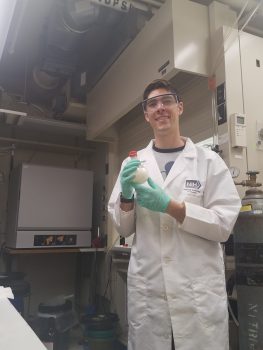
This summer I worked in the lab of Dr. Ken Jacobson in the National Institute of Diabetes and Digestive and Kidney Diseases at the National Institutes of Health in Bethesda, Maryland.
The lab studies the structure-activity relationship of G-protein coupled receptors and small molecules. In this, I was tasked with the synthesis of various new drugs to work as antagonists against a specific type of receptor. The receptor I worked on has been implicated in the inflammatory response in relation to asthma as well as certain types of liver diseases and cancers. Through my work, we were able to add to the library of known compounds that antagonize this receptor and help elucidate leads for better treatments of these diseases.
At this experience I was able to further develop my abilities as a chemist, learning new ways to troubleshoot and problem solve. I was able to experience the environment of a large academic lab as well as work alongside accomplished scientists and postdocs who were able to guide me through my project. In the future, I hope to continue as a professor of chemistry.



